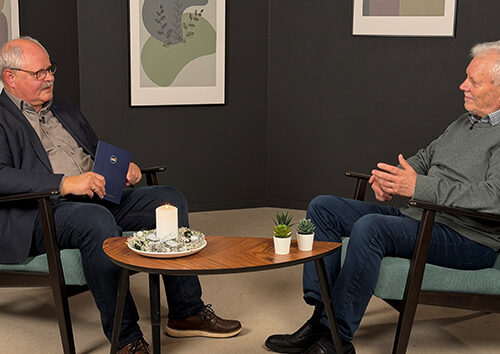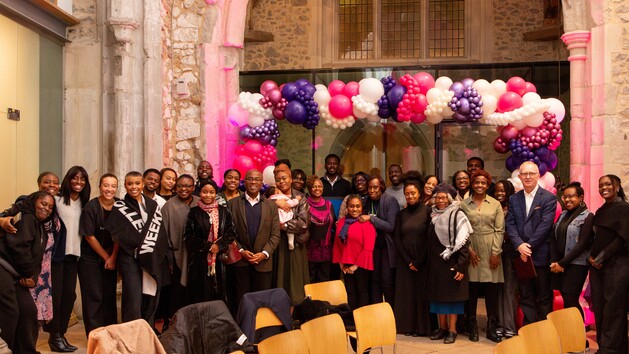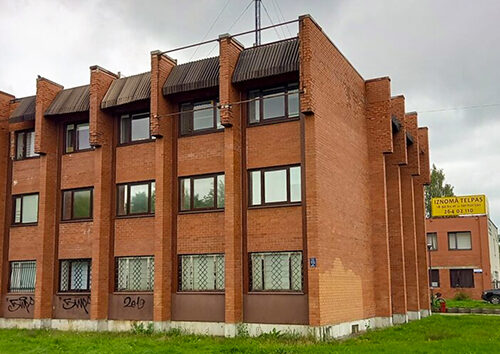4 April 2019 | Binfield, UK [Helen Pearson/tedNEWS]
How do you forgive and build bridges with the man who murdered your father? That is the reality for Jo Berry, the daughter of British politician Sir Antony Berry who was one of five killed in the October 1984 Brighton bombing of the Conservative Party annual conference.
![Newbold pastor, Marcel Ghioalda, reflects on the Jo Berry & Patrick Magee story. [All photos: Victor Hulbert] forgivenss project newbold](https://ted.adventist.org/sitenews/wp-content/uploads/2019/04/images_forgivenss_project_newbold.jpg) Patrick Magee served a prison sentence for planting that IRA bomb. That horrific event created a relationship between Jo Berry and Patrick Magee which could have led to a lifelong hatred. Instead, the two have been on a journey together which has led them to sharing over 300 platforms around the world and promoting the idea that forgiving bridges between perpetrators and victims can be built.
Patrick Magee served a prison sentence for planting that IRA bomb. That horrific event created a relationship between Jo Berry and Patrick Magee which could have led to a lifelong hatred. Instead, the two have been on a journey together which has led them to sharing over 300 platforms around the world and promoting the idea that forgiving bridges between perpetrators and victims can be built.
The 2 April Newbold Diversity lecture where Berry most recently told her story came as part of a larger two-week ‘Forgiveness Project‘ at Newbold Church and college that explored the theme of forgiveness through the lives of people who have made remarkable choices.
 Berry captivated and moved her audience as she shared the story of her journey from being a young pacifist who, before the night of her father’s murder had ‘felt like a free spirit’. Now she has a global career, facilitating and teaching peace-making, reconciliation and restorative justice. Her talk and Q&A session was peppered with references to various acts of terror and atrocity – not just in Ireland but in Rwanda and the former Yugoslavia, in Norway with Anders Behring Breivik, in the UK with the murder of Jo Cox and most recently in New Zealand. All these conflicts left behind human lives full of a pain that is quickly ignored as media attention rapidly moves on to the next drama.
Berry captivated and moved her audience as she shared the story of her journey from being a young pacifist who, before the night of her father’s murder had ‘felt like a free spirit’. Now she has a global career, facilitating and teaching peace-making, reconciliation and restorative justice. Her talk and Q&A session was peppered with references to various acts of terror and atrocity – not just in Ireland but in Rwanda and the former Yugoslavia, in Norway with Anders Behring Breivik, in the UK with the murder of Jo Cox and most recently in New Zealand. All these conflicts left behind human lives full of a pain that is quickly ignored as media attention rapidly moves on to the next drama.
Her journey of reconciliation began entirely alone with only curiosity about ‘why the IRA used violence’ and ‘trusting that somehow, life would give me experiences.’ And it did. First, she met an Irish taxi-driver whose brother had been killed by ‘her side’ – a British soldier. The conversation gave her the belief that people who should have been enemies could communicate. She began to believe, “I can build a bridge across the divide,” and, she confessed, “the conversation made me feel I had done something.”
 Subsequently she travelled to Northern Ireland, meeting others from ‘victim’ families on both sides and constantly trying to understand terrorists – what do they think or feel as they murder others? Slowly the idea of meeting her father’s murderer grew in her mind and eventually the invitation was sent and rejected – three times. Eventually, 16 long years after the bombing, they met.
Subsequently she travelled to Northern Ireland, meeting others from ‘victim’ families on both sides and constantly trying to understand terrorists – what do they think or feel as they murder others? Slowly the idea of meeting her father’s murderer grew in her mind and eventually the invitation was sent and rejected – three times. Eventually, 16 long years after the bombing, they met.
A written report cannot do justice to Jo’s story of the meeting with her father’s murderer – of the questions and thoughts that went through her mind. To hear that, people must join the hundreds of other people who have watched the talk for themselves on the Newbold College of Higher Education Facebook page. The account includes a description of a high inter-personal drama as two strangers navigated the distances and barriers between them and came to recognise a measure of mutual humanity.
 This was not a story minimising or cheapening the challenges of such a relationship. Both participants had stepped on to what Jo describes as an emotional roller coaster. Magee evidently went to a library to find a book about ‘what you do when you meet the daughter of someone you have killed?’ There are still times when he wants to go back and justify what he did, and Berry still finds it hard to listen to him do that.
This was not a story minimising or cheapening the challenges of such a relationship. Both participants had stepped on to what Jo describes as an emotional roller coaster. Magee evidently went to a library to find a book about ‘what you do when you meet the daughter of someone you have killed?’ There are still times when he wants to go back and justify what he did, and Berry still finds it hard to listen to him do that.
But they talk about it again. The progress of the relationship, the effects on Berry’s children – all have been explored. Eventually she had to ask herself, “If I had experienced everything Patrick has experienced, would I have made the same decision?” Her answer: “Every time I suspend judgement, open my heart and become present to the other person, I ask ‘would I make the same choice’, and there is nothing to forgive.” As she travels to Rwanda and other places the coming to a recognition of common humanity in both sides of a reconciliation process has become a recurrent experience.
Berry made no claims that she is now incapable of getting angry and hurting people. “It is hard. I still get angry and want to blame someone else,” she confessed. “It’s about recognising anger and changing our response.”
 What about the place of feelings in forgiveness? Feeling anger at the injustice done to her and her family was a total part of Jo’s journey. “All feelings are understandable,” she says, “what matters is what we do with them… Some people have to do a lot of emotional work… it can be really hard.”
What about the place of feelings in forgiveness? Feeling anger at the injustice done to her and her family was a total part of Jo’s journey. “All feelings are understandable,” she says, “what matters is what we do with them… Some people have to do a lot of emotional work… it can be really hard.”
So, has Berry experienced forgiveness? She claims she is still learning. Even she has doubts about the use of the word ‘forgiveness’ which suggests a power imbalance between the ‘forgiver’ and the ‘forgiven’. Her concern is for the development of a community which moves from having power over others to sharing and working together. She works for a community where all needs are met, and people give up being what she calls ‘righteous’. “When people are righteous, they think they are right and blame others,” she says. In the world that Berry dreams of, whether we are believers or not, everyone can find their own way to give up blaming and punishing people and learn to see people in their full humanity.
 In conclusion, Jo came back to the world of today: Brexit disagreements, or knife crime where kids she has met at London schools say they feel less safe. “What we need are safe places around the country where people listen and offer dignity and respect to each other. What we need is ‘a policy of cups of tea with the other’,” she said.
In conclusion, Jo came back to the world of today: Brexit disagreements, or knife crime where kids she has met at London schools say they feel less safe. “What we need are safe places around the country where people listen and offer dignity and respect to each other. What we need is ‘a policy of cups of tea with the other’,” she said.
In the Q&A, Jo covered ideas about forgiveness on a personal and national scale, about not ‘letting people walk all over us’, about the effect on her health of her work, the difficulties of owning and taking responsibility for our own feelings and on prejudice that seems to be passed on from one generation to another. She responded to one question with one of her most memorable quotations: ‘Revenge is like drinking poison and hoping someone else will die!’
As the Forgiveness Project concludes at Newbold Church and College, the hope is that Newbold people and their surrounding communities will be drinking tea together, not poison!
For additional photos visit the TED Facebook page.
tedNEWS Staff: Victor Hulbert, editor; Deana Stojković, associate editor
119 St Peter’s Street, St Albans, Herts, AL1 3EY, England
E-mail: [email protected]
Website: www.ted.adventist.org
tedNEWS is an information bulletin issued by the communication department of the Seventh-day Adventist Church in the Trans-European Division. Readers are free to republish or share this article with appropriate credit including an active hyperlink to the original article.



